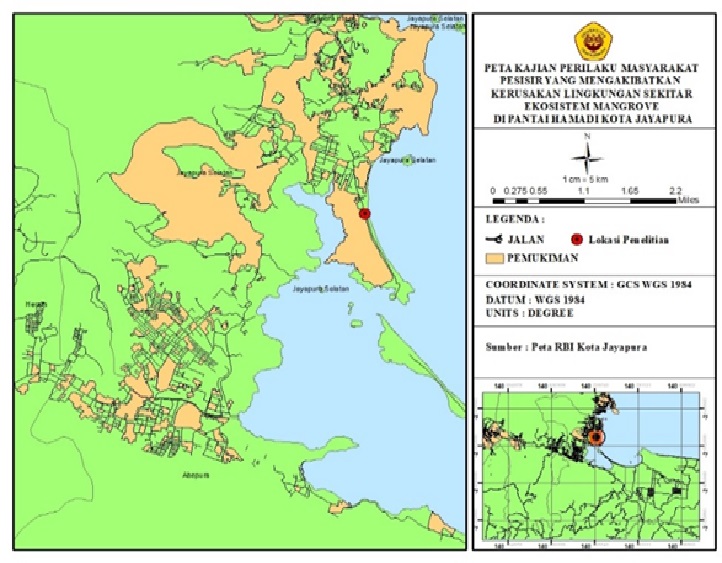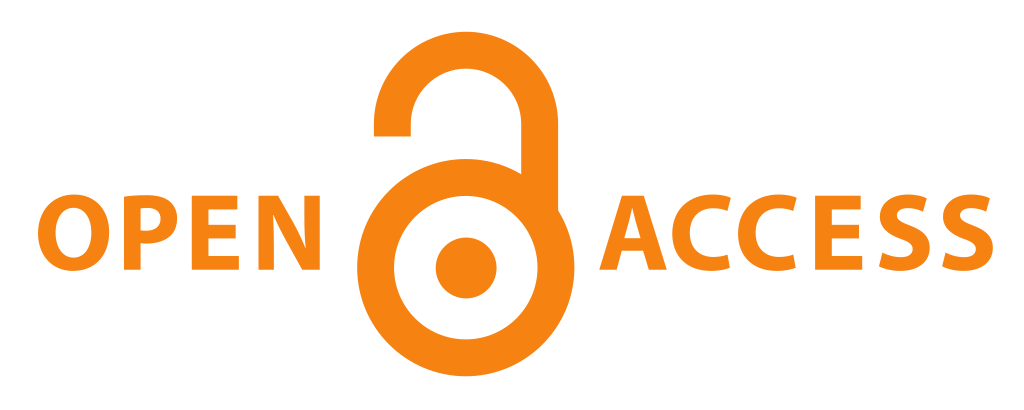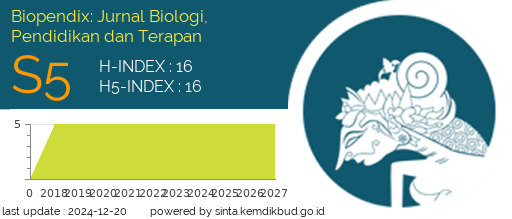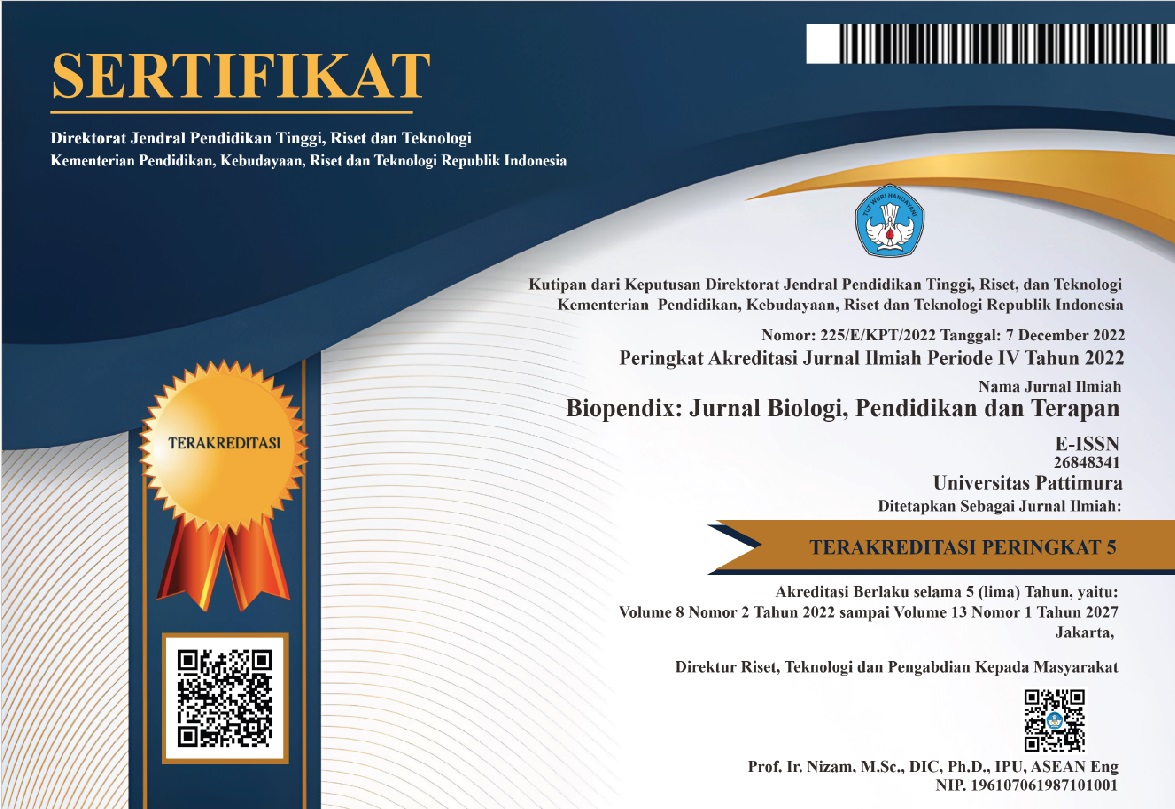KAJIAN PERILAKU MASYARAKAT PESISIR YANG MENGAKIBATKAN KERUSAKAN LINGKUNGAN SEKITAR EKOSISTEM MANGROVE DI PANTAI HAMADI KOTA JAYAPURA
Abstract
Background : Environmental damage around the Hamadi coastal mangrove ecosystem, South Jayapura District, Jayapura City, which is caused by many human behavioral factors on the coast, one of which is due to tourism activities that throw away garbage so that it becomes dirty and the natural beauty is damaged. he waste has not been fully addressed effectively if the management is not carried out properly, which then becomes a serious threat to the sustainability of the mangrove ecosystem area near Hamadi Beach which is used as a tourist spot. Therefore, it is necessary to conduct a study of the behavior of the community living around the area and utilizing the area.
Method: The researcher used 30 respondents as samples and conducted in June to August 2024 on Hamadi Beach, South Jayapura District, Jayapura City using the data usage technique in this study is Simple Random Sampling, which is carried out randomly from members of the population without considering the level of the population. The data that has been obtained is analyzed using the Likert Scale.
Results: Respondents were dominated by men, productive age 36-45 years old, predominantly high school education, fishermen, who had an income Rp 1.000.000 -Rp2.000.000. Socio-economic characteristics describe respondents who live, sell and travel around the area. The characteristics of the respondents were seen from the community's perception of the knowledge of the function of the mangrove ecosystem (3,39) including the category strongly agree, Public Perception of Environmental Conditions for the Growth of Mangrove Ecosystems (3,5) Including the category of strongly agreeing, public perception of the utilization of mangrove ecosystems (3,14) including the category of agree.
Conclusion: The development of science about public perception that results in environmental damage to the mangrove ecosystem on Hamadi beach needs to be known in early countermeasures.
Downloads
References
Amalia, F., & Putri, M. K. (2021). Analysis of Inorganic Waste Management in Sukawinatan Palembang City. Swarnabhumi Journal, 6(2), 134–142. https://jurnal.univpgri-palembang.ac.id/index.php/swarna/article/view/5452
Hakim, M. Z. (2019). Pengelolaan dan Pengendalian Sampah Plastik Berwawasan Lingkungan. Amanna Gappa, 27(2), 111–121.
Jayantri Adinda Syawal, R. M. A. (2021). 20021-45610-1-Pb. Junal Kajian Ruang, 1(2), 1–15. http://jurnal.unissula.ac.id/index.php/kr
Mendrofa, S., & Davinay, R. (2024). Strategi Pengembangan Ekowisata Mangrove Berbasis Daya Dukung Kawasan Di Kelurahan Oesapa Barat Kecamatan Kelapa Lima Kota Kupang. Jurnal Ilmu Dan Teknologi Kelautan Tropis, 16(1), 63–74. https://doi.org/10.29244/jitkt.v16i1.51719
Nasution, A. S., Hasibuan, A. S., Thoibah, B., Pratiwi, D. A., Ayenti, E., Pratiwi, K. P., Barus, M. B., Sirait, S. A., Priyatna, S. H., Mawaddah, Q., & Ayu, D. (2023). Kajian Perilaku Masyarakat Pesisir yang Mengakibatkan Kerusakan Lingkungan di Pantai Mangrove Desa Tanjung Rejo Kecamatan Percut SEI Tuan. El-Mujtama: Jurnal Pengabdian Masyarakat, 4(2), 751–758. https://doi.org/10.47467/elmujtama.v4i2.4338
Saidah, S., Harudu, L., & Kasmiati, S. (2024). Deskripsi Kerusakan Ekosistem Hutan Mangrove. Jurnal Penelitian Pendidikan Geofrafi, 9(1), 11–23.
Sopian, D., & Suwartika, W. (2019). Pengaruh Sistem Informasi Akuntansi Dan Sistem Pengendalian Internal Terhadap Kinerja Karyawan. JSMA (Jurnal Sains Manajemen Dan Akuntansi), 11(2), 40–53. https://doi.org/10.37151/jsma.v11i2.5
Sugiyono. (2020). Metodologi Penelitian Kuantitatif, Kualitatif dan R & D.

Copyright (c) 2024 Lolita Constantia Tuhumena

This work is licensed under a Creative Commons Attribution-ShareAlike 4.0 International License.
Authors who publish with this Journal agree to the following terms:
- Author retain copyright and grant the journal right of first publication with the work simultaneously licensed under a creative commons attribution license that allow others to share the work within an acknowledgement of the work’s authorship and initial publication of this journal.
- Authors are able to enter into separate, additional contractual arrangement for the non-exclusive distribution of the journal’s published version of the work (e.g. acknowledgement of its initial publication in this journal).
- Authors are permitted and encouraged to post their work online (e.g. in institutional repositories or on their websites) prior to and during the submission process, as it can lead to productive exchanges, as well as earlier and greater citation of published works




 2
2






